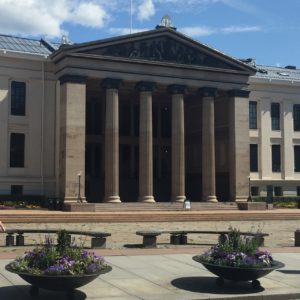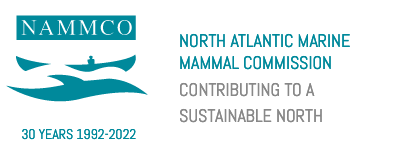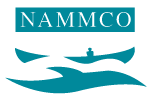22 July 2019: Keynote Talk at ISHPSSB Conference
This year, NAMMCO Scientific Secretary Fern Wickson was invited to be a plenary keynote speaker at the biennial conference of the International Society for the History, Philosophy and Social Studies of Biology (ISHPSSB). The conference was held in Oslo from 7-12 July and Fern gave her talk on the first night at the beautiful Aula building of the University of Oslo, just opposite the National Theatre. The talk was open to all members of the public as well as conference participants.

University of Oslo’s Aula
The title of the talk was “Lessons Learned from Waterfleas, Whales and Bees: A journey into environmental controversies in the search for sustainable food”. The abstract for Fern’s talk is reproduced below.
Ecology seeks to understand how organisms interact with their environment. It is a biological science that looks at how things are interconnected, how they interrelate. I am an ecologist interested in how we, the human species, interact with our environment. My work is transdisciplinary; researching the human/nature relationship through overlapping lens of biological science, ecological ethics and environmental politics. In this talk I will present some of the lessons I have learned about how ethics and politics are entangled in the science of environmental harm. These are lessons I have learned from working with waterfleas, whales and bees.
How we feed ourselves, as a species, is one of the foundational ways we construct and conduct our interaction with nature/the environment/our ecological community. It is a key mode of entry into our relationship with the rest of life on Earth. Today there is increasing recognition that modern industrial food systems have created extensive environmental damage and there is an urgent quest to find sustainable solutions. In this quest though, certain technologies and practices generate intense socio-political controversy over their role in a sustainable future.
This presentation will explore two such sustainable food controversies: genetically modified organisms (GMOs) in agriculture and the hunting of whales and seals in the North Atlantic. Through my ongoing engagement with these issues, I will demonstrate how the question of what constitutes environmental harm is a splendid swirling nexus of science, ethics and politics. And that in this complexity, there is much we can learn from being attentive to waterfleas, whales and bees. Indeed, to all the other species we share this extraordinary planet with.
As part of the talk, Fern used a framework of care ethics and politics (developed in her previous work on the governance of agricultural biotechnologies), to illustrate the wide range of relevant issues to consider in the debate about whether marine mammals can be part of sustainable food systems.

This included asking questions about:
1. The networks of relationships between whales and humans, including all of the anthropogenic activities that impact them;
2. The difference between the historical context when the commercial moratorium on whaling was decided by the International Whaling Commission and the current situation today;
3. The distribution of power in terms of who gets to decide what is permissible and whose knowledge and experience counts in decision-making;
4. The dependence that some coastal and indigenous communities have on whaling for their cultural identity and livelihood;
5. The role that emotion currently plays in this debate; and
6. The cultural narratives that frame environmental values and our understanding of the impact of different human activities.
More information about the ISHPSSB conference, program and talks is available here:
https://ishpssb2019.tekniskmuseum.no/program/schedule#keynote



